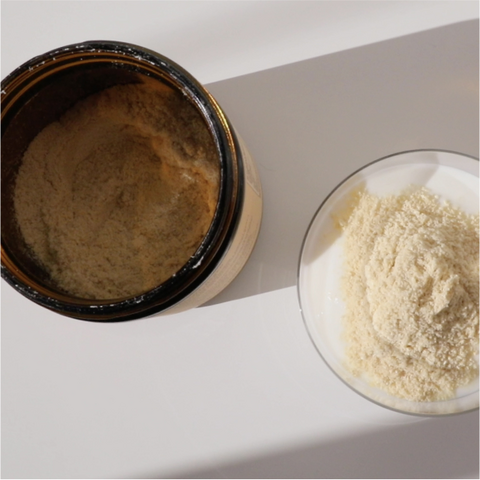The adaptogenic herb Ashwagandha has been used in Ayurvedic practice for thousands of years as a Rasayana, or rejuvenating tonic. Newer research is now confirming what traditional wisdom intuited, and Ashwagandha has been shown to help regulate the hormone cortisol, helping protect your body from the numerous negative effects of chronic stress.
Curious whether taking Ashwagandha supplements can help address any of your health and wellness concerns? First, let’s dive into what the herb actually is.
What is Ashwagandha?
Ashwagandha, or Withania somnifera, is a flowering shrub whose roots, leaves, and berries are relied upon heavily in Ayurveda to harmonize mind, body, and spirit. It’s a calming nervine — an herb that has a therapeutic effect on the central nervous system —known as an adaptogen to buffer life’s stresses.
Used for millennia, it belongs to the Rasayana, or life-prolonging, branch of Ayurvedic tradition, as a tonic to rejuvenate and invigorate the body (1).
Also known as Winter Cherry and Indian Ginseng (although it’s not related to Ginseng), this Ayurvedic herb belongs to the nightshade family and is native to India, Nepal, and parts of Southern Africa. The name “Ashwagandha” itself is a Sanskrit word meaning “smell of the horse,” which refers to both its unique scent and potential to benefit strength and virility.
The name “Ashwagandha” itself is a Sanskrit word meaning “smell of the horse,” which refers to both its unique scent and potential to benefit strength and virility.
Because its popularity has spread in recent years, Ashwagandha extract, pills, powders, tinctures and gummies have cropped up all over the shelves of whole foods and natural grocers. But not all Ashwagandha supplements are sourced, extracted, and formulated with the same quality controls, so be selective when choosing one.
Our organic Ashwagandha powder is hand-harvested in India and 3rd party tested to ensure purity and quality. It’s a 15:1 concentrate, meaning that in every 1/4 tsp, you get 600mg of Ashwagandha.
So what are the health benefits of Ashwagandha? Here’s everything you need to know.
Is Ashwagandha Good for Stress?
Ashwagandha is classified as an adaptogen, meaning a plant that helps the body cope with stress by resisting the negative effects of the stress hormone, cortisol. Numerous clinical studies show Ashwagandha holding huge promise.
In one double-blind, randomized study of 58 healthy adults (but stressed), those who consumed Ashwagandha daily for 8 weeks had a significant decrease in stress symptoms and cortisol levels (2).
It’s theorized that Ashwagandha may influence the hypothalamic-pituitary-adrenal axis, or HPA axis (more research is needed to confirm this). That’s the system in your body that regulates the stress response, bringing your hormones back to a place of homeostasis when chronic stress causes things to go awry.
Overall, taking Ashwagandha daily may help support a healthy stress response.
Is Ashwagandha Good for Mood?
Along with its benefits for chronic stress, early research suggests that Ashwagandha could also potentially improve occasional anxiety. In one study of 60 individuals (3), those who consumed 240 milligrams of Ashwagandha daily for one month exhibited significantly reduced stress.
However, more studies need to be done, so we still don’t have a scientific consensus on how and whether Ashwagandha should be relied on to treat psychiatric disorders like anxiety.
Is Ashwagandha Good for Sleep?
In health, your cortisol levels will naturally decrease in preparation for sleep. But stress overrules this rhythm, keeping cortisol levels elevated at night and disrupting sleep. Ashwagandha is helpful for regulating the production of cortisol, while in Ayurveda it’s thought to revitalize your life energy flow, or in that school of thought, the key to being able to rest deeply.
Sleep and stress go hand in hand. One affects the other, and vice versa. Several studies have shown that Ashwagandha benefits sleep quality, especially in those with difficulty sleeping, as well as improved mental alertness and mood in the mornings.
In the small placebo-controlled study that looked at 58 participants (1), those who took the 250 or 600 mg of Ashwagandha supplements not only felt less stress, but also reported significantly better quality of sleep compared to those who took the placebo.
Another study of 50 senior adults (4) found that those who took 600 milligrams of Ashwagandha each day for 12 weeks experienced significantly better sleep and felt more mentally alert in the mornings compared to the control group.
Though its scientific name, Withania somnifera, suggests a “sleep-inducing” ability, its effects are calming rather than directly sedative, so it can be taken in the morning. In fact, Ashwagandha has been clinically shown to enhance focus and mental stamina and is often used to support a healthy circadian rhythm from day to night (5).
Taking Ashwagandha daily can help support better rest and better wakefulness. It can help you sleep, but it won’t put you to sleep, in other words.
Is Ashwagandha Good for Sex Drive?
Ashwagandha is often used as a tonic for sex drive and male fertility, and here’s what the science says about that. In one study (6), standardized Ashwagandha was associated with an 18% increase in DHEA-S, a hormone that contributes to the production of testosterone, which is integral to healthy sexual function. Participants showed a 14.7% increase in testosterone compared to those who took the placebo.
Is Ashwagandha Good for Weight Loss?
More science is needed to find out whether Ashwagandha directly contributes to weight loss, but here's what we know. Ashwagandha is shown to support healthy weight management. A review of 24 studies found that Ashwagandha was effective at supporting blood sugar levels and because blood glucose levels are interconnected with metabolism and weight gain, Ashwagandha could be beneficial for weight loss.
Because Ashwagandha has the ability to help regulate cortisol, it could also have an effect on stress-related weight gain.
Where exercise is concerned, this adaptogen has been shown to enhance physical exercise by both improving oxygen consumption and increasing muscle mass, which may help the body burn more fat during times of rest (7, 8, 9).
Ashwagandha has been shown to enhance physical exercise by both improving oxygen consumption and increasing muscle mass.
Is Ashwagandha Good for Hair?
Ashwagandha has been used both orally and topically to address a number of physical concerns, including hair troubles. One reason is that because stress can be a major contributor to excessive hair shedding, Ashwagandha’s ability to counter cortisol can help reduce stress-related shedding.
Another reason is that Ashwagandha may help with scalp irritation, dandruff, and itch. It also contains beneficial elements like antioxidants and amino acids, which could further strengthen the hair.
If you’re curious to try Ashwagandha for hair concerns, the best place to look would be a quality hair supplement combining traditional multivitamin hair support and adaptogenic potencies. SuperHair® contains Ashwagandha along with 10 hair vitamins and botanicals like Saw Palmetto to promote thicker, healthier hair.
How to Take Ashwagandha Supplements
There are many ways to take Ashwagandha but how much Ashwagandha should you take?.
Our Ashwagandha powder can easily be mixed into food and drinks — it has a distinct, molasses-like flavor that pairs well with chocolate, coffee, maple, and baked goods.
If you prefer a pill, SuperYou® is a daily stress management supplement that combines Ashwagandha with other powerful adaptogens to help regulate cortisol for energy, mood, and focus. 2 caps a day keep the stress away!
As with any plant remedy, consistency is key, so it’s best to take your Ashwagandha supplement daily to track how health benefits manifest in your life. When taken regularly Ashwagandha supplements can benefit both men and women.
Sign Up, Nerd Out
Get wellness tips, education, and recipes
delivered straight to your inbox.
Get wellness tips, education,
and recipes delivered
straight to your inbox.
Sources
- National Library of Medicine, An Overview on Ashwagandha: A Rasayana (Rejuvenator) of Ayurveda https://www.ncbi.nlm.nih.gov/pmc/articles/PMC3252722/
- National Library of Medicine, Adaptogenic and Anxiolytic Effects of Ashwagandha Root Extract in Healthy Adults: A Double-blind, Randomized, Placebo-controlled Clinical Study https://www.ncbi.nlm.nih.gov/pmc/articles/PMC6979308/
- National Library of Medicine, An investigation into the stress-relieving and pharmacological actions of an ashwagandha (Withania somnifera) extract: A randomized, double-blind, placebo-controlled study. https://www.ncbi.nlm.nih.gov/pmc/articles/PMC6750292/
- National Library of Medicine, Efficacy and Tolerability of Ashwagandha Root Extract in the Elderly for Improvement of General Well-being and Sleep: A Prospective, Randomized, Double-blind, Placebo-controlled Study https://www.ncbi.nlm.nih.gov/pmc/articles/PMC7096075/
- National Library of Medicine, Efficacy of Different Concentrations of Withanolides in Ashwagandha Supplements for Insomnia and Enhancing Energy Levels. https://www.ncbi.nlm.nih.gov/pmc/articles/PMC9194423/
- National Library of Medicine, A Randomized, Double-Blind, Placebo-Controlled, Crossover Study Examining the Hormonal and Vitality Effects of Ashwagandha (Withania somnifera) in Aging, Overweight Males. https://www.ncbi.nlm.nih.gov/pmc/articles/PMC6438434/
- National Library of Medicine, Effects of Ashwagandha (Withania somnifera) on Physical Performance: Systematic Review and Bayesian Meta-Analysis. https://www.ncbi.nlm.nih.gov/pmc/articles/PMC8006238/
- National Library of Medicine, Effects of Ashwagandha (Withania somnifera) on VO2max: A Systematic Review and Meta-Analysis. https://www.ncbi.nlm.nih.gov/pmc/articles/PMC7230697/
- National Library of Medicine, Examining the effect of Withania somnifera supplementation on muscle strength and recovery: a randomized controlled trial. https://www.ncbi.nlm.nih.gov/pmc/articles/PMC4658772/
















